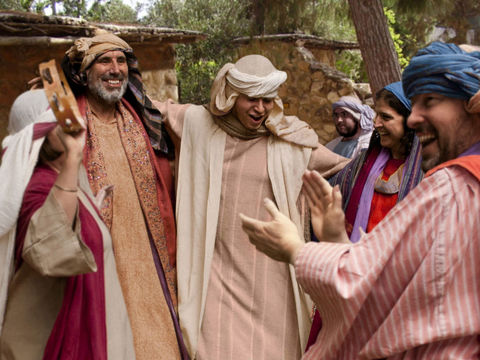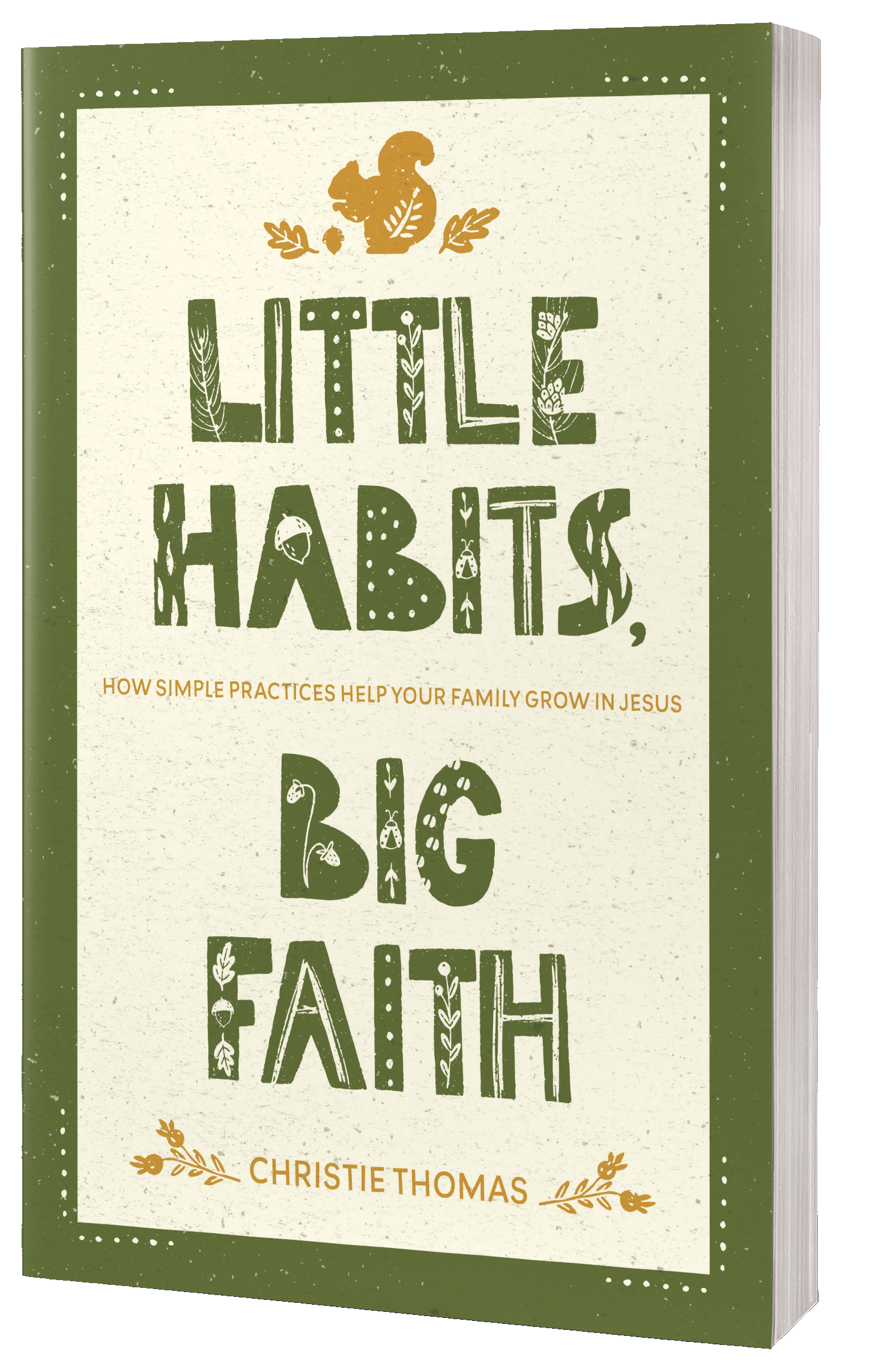I was in Children’s Ministry a long time.
In fact, I started when I was still a kid – at age 12 I started volunteering in Sunday School. I spent most of the next 24 years either in either paid or volunteer ministry.
At 18 years old, I led a preschool Sunday School class in the hallway of a community center, where I used fake potted plants to keep the kids from running off.
I ran the preschool summer programs at a local megachurch, where we once had 57 five-year-olds in one room.
And I was the Director of Children’s Ministries at my mid-sized church for most of 2006-2018 (barring a little time off for each of my 3 babies).
And I have to tell you, Children’s Ministry is one of the most amazing places in the world. But it can also be one of the saddest places in the world.
Why the Children’s Ministry world breaks my heart
Children’s Ministry holds out the offer of abundant life but often leads kids on a wild goose chase around the desert instead of taking them to the well of Living Water.
It’s like taking a thirsty child to a water fountain but not teaching them how it works, or like baking bread in the kitchen but only letting them smell it.
Instead, we offer fun.
We offer crazy crafts and wacky games and frenzied action songs and amazing play structures and rewards for Bible memory.

Having fun is great, but not at the expense of the Gospel.
I’m not against fun. Ask the kids in my church – they’ve seen me do some pretty crazy stuff. But so much of the fun that you see in Sunday School lessons are missing the point: the Gospel.
Here is Where We Most Often Miss the Mark:
There are multiple places where we spin out of control with our quest for fun material, but one of the most glaring is when we over-emphasize the animals in Bible stories.
I have some unfortunate news for the creators of Sunday School content: the Bible is not about animals.
Unfortunately, in the Kidmin world, transformative storytelling has been overshadowed by cute animal crafts and games.
>>Related post: The Bible Is Not About You: Why we have to stop looking for “life application”
CASE STUDY 1: The Prodigal Son
If you do a Pinterest search for “Prodigal Son Activities”, I can guarantee that 90% of what you’ll find will be about pigs. Why is that?
Is the story really about the pigs?
They really just make a cameo appearance, but most lessons will choose to base all their hands-on activities on pigs. From pig cookies to games to cute pig crafts, we have turned a powerful lesson about God’s love into a lesson on barnyard animals.
CASE STUDY 2: Daniel And the Lion’s Den
If you do a Google search for “Daniel and the Lion’s Den Activities”, 99% of what you’ll find will be about lions, with very little mention of Daniel or God. Why is that?
Is the story really about the lions?
If you replaced “lion’s den” with “guillotine” in the story, I am pretty sure we wouldn’t make crafts about it. (Yikes!)
Those adorable lion masks that we are so intent on making have turned a life-changing lesson about the power of God into a how-to-roar-like-a-lion lesson.
CASE STUDY 3: Jonah
If you do a Google or Pinterest search for “Jonah Activities”, I can guarantee that 99% of the activities you find will be about whales/fish.
But was the fish the main character in the story?
Really, is the book of Jonah really even about the fish? Or is the fish a tool used by God to teach us something greater about Himself? Does a cute paper bag whale with a paper Jonah inside him really teach kids God’s love and forgiveness?

I get it. Animals crafts and games are fun for kids. They’re easy to think of, easy to plan, and easy to do with kids.
And I point the finger at my own self here, not at others. In fact, I’ve used all three of these in my curriculum! This is something that has bothered me for years, but I have often not had the tenacity to change every lesson plan.
Animals are cute and make utterly adorable crafts.
But in our quest for cute, we have left behind the power of the stories.
Does God Love Animals?
Let’s take a rabbit-trail for a moment. Does God love animals?
Yes, yes he does. When God made animals, he said, “it is good”. When he made people, he said, “look at all these awesome creatures I made! Take good care of them, ok?”
Animals and humans go together like macaroni and cheese. Our good God created us with an innate love of animals, so the worth of animals is not up for debate.
Ok, we got that sorted. Ready to get back to the main point?
When we focus completely on the animal in any particular Bible passage, we usually miss the meaning of the story.
This isn’t just a children’s ministry issue.
It’s a children’s book, children’s education, children’s-everything-to-do-with-the-Bible issue.
My friend Amber didn’t grow up in the church, and she’s now a Sunday School teacher and a mom, trying to show Jesus to her kids. She said this about this issue:
“It is especially relevant for parents of small children that get caught up in the stories in the slowed-down children’s versions which do primarily focus on the animals. You forget the bigger picture or don’t realize the real meaning and truth behind the story.” <–Wisdom.
So how can we change our lessons so that they’re more impactful for our kids?
1. DITCH THE ANIMAL CRAFT
2. START ASKING ONE MAJOR QUESTION:
Let’s go back to our case studies, ask this key question, and see if we can figure out some better activities for each one.
CASE STUDY 1) The Prodigal Son
A) What does this story show us about God?
God is represented by the father in the story, who unconditionally loves not one, but two very self-centered sons. Most people will find themselves identifying with both sons at different times in their lives. Sometimes we will be like the one the selfish, short-sighted prodigal, and sometimes we will be like the judgemental, disrespectful older brother. But the Father forgives and accepts the sons, even though neither of them seems truly repentant! WOW. That has huge implications for our lives.
Can you see how there is more to this than pigs? In fact, they’re not even really part of this story, except as a contrast to the Father’s house. They represent the poor choices of the prodigal. (Ahem, and maybe we shouldn’t make a craft that glorifies the poor choices…)
B) What activities could we use that would teach our kids about God’s unconditional love?
Thankfully, that’s not as tricky as you thought. Simply type in “activities about God’s unconditional love” into Google, and you have a whole treasure chest full of fun activities that kids will love AND teach kids about God. I found many fantastic choices in the first three search results.
No pigs needed.

Image from freebibleimages.org
CASE STUDY 2) Daniel and the Lion’s Den
A) What does this story show us about God?
It shows us that God is faithful and sovereign over all creation and that He is the only one worthy of worship. There is definitely more to this story than lions.
B) What activities could we do that would teach our kids about God’s faithfulness?
Again, simply go to Google and type in “Activities about God is faithful”.

Image from freebibleimages.org
CASE STUDY 3) Jonah and the Whale
A) What does this story show us about God?
It shows us that God gives second chances, that God is gracious and compassionate, and that God cares the “other”.
B) What activities could we do that would teach our kids about God’s mercy and love for those who are different from us?
We could teach them about a different culture with a different faith, then pray. Or we can go the Google route again, and search “activities about God’s mercy”.
///
See? It’s all in the questions you are asking. Ask a better question, get a better answer.
What story do you want to reframe today? Let me know in the comments and we can brainstorm together!
Together, we can bring our children to the Well of Living Water – Jesus. We only have a few hours per year with them – let’s make them count.





“Ask a better question, get a better answer”…. love this!! Amen to the whole post – great job for speaking out and showing alternative options. Thank you so much 🙂
Thanks Lois! I’m glad it was helpful.
Jesus heals Peter’s mother-in-law… the craft is making a picture using Band-Aids and other Frist Aid supplies to make a picture showing how you help someone feel better. This just leaves me Bleah. I want something about God heals; God comforts.
Yes Julie, I totally agree! When we try to shove a nice little craft into each Bible story, we lose a lot of its power.
As a new and young children’s worker I’ve been looking at tips and advice on how to do kid’s ministry. This is so refreshing to read and very helpful. I’ve recently bumped into “Show Them Jesus” by Jack Klumpenhower and it’s along the same lines. Thank you!!!
I LOVE that you want to show them Jesus, not just the stuff we sometimes get sidetracked with. Keep journeying with God and He will help you teach well!